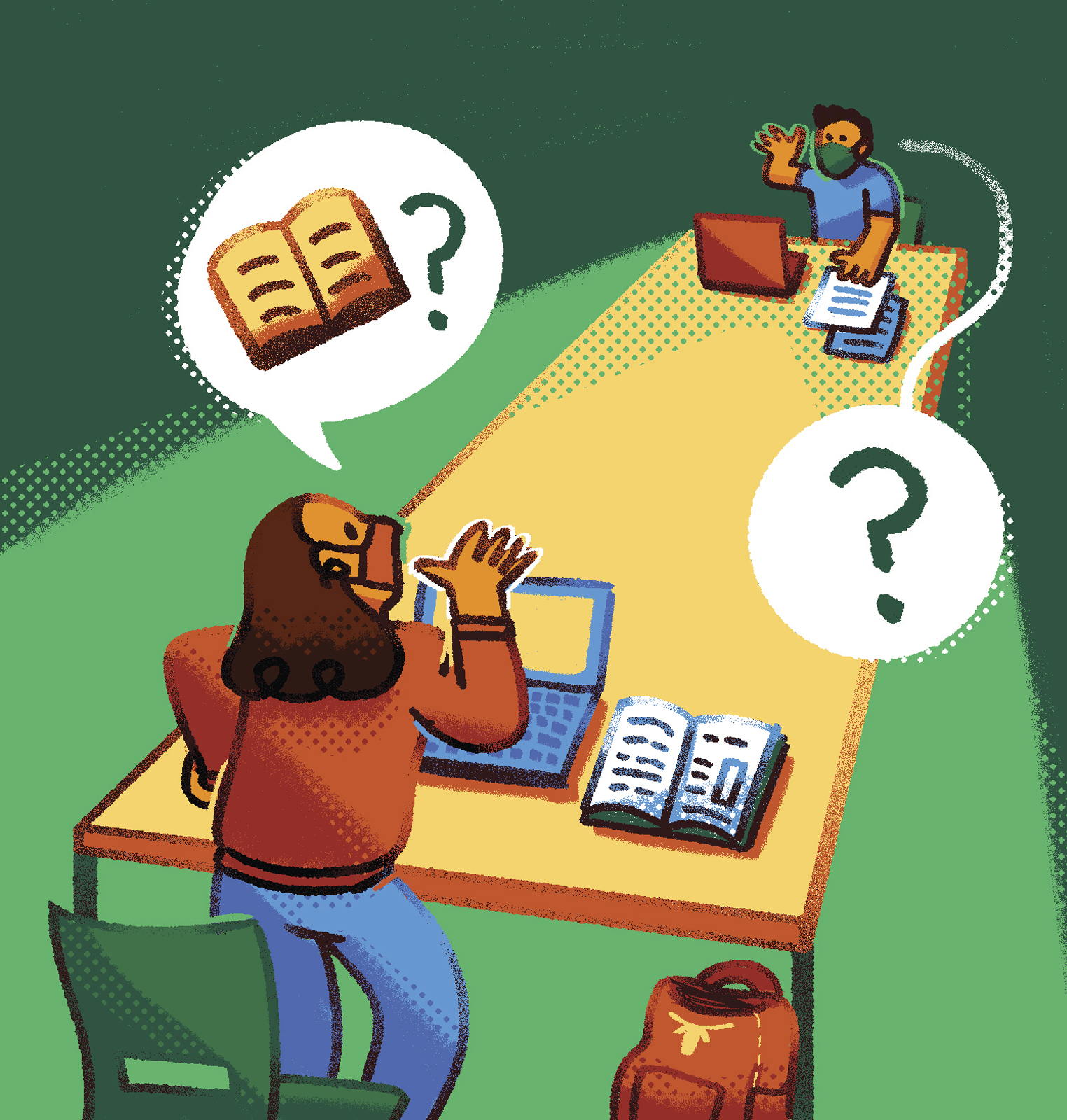UT Students and Faculty Find New Ways to Feel Connected During the Pandemic

One afternoon in August, just a few days before the fall semester was set to begin, my roommate let out a long sigh. She was gearing up for her first year of grad school at UT’s LBJ School of Public Affairs, where all of her classes would be virtual.
“What if I don’t make any friends?” she asked. The question held more weight than typical first-day-of-school nerves. We had barely left our apartment since March, having had the privilege to work from home since the start of the pandemic. She had no idea how socializing with other students would look. Would it be awkward? Would she come across like herself? Would she be able to make a lasting friendship?
At first, reaching out to classmates online seemed intimidating. But as the semester unfolded, she got involved with elections for the Graduate Public Affairs Council and joined in on her cohorts’ Slack channel. Still, making connections felt hard. And the effort was often just another reminder of everything she was missing.
“Students don’t even have the ability to easily give their friends a hug right now,” says Marci Gleason, an associate professor in the Department of Human Development and Family Sciences. “It’s a real loss.”
She also points out that students are lacking important small moments—from their study groups to running into acquaintances walking across campus. As a professor, she has had to find ways to connect with her students, setting up small group video calls so she can interact with them on a more personal level. “I actually think I’ve gotten to know more of my students this way than I have in the past,” Gleason says.
This past November, Gleason’s colleague and fellow associate professor Hannah Williamson published a study in the journal Psychological Science observing the effects of the pandemic on intimate relationships. The study included more than 600 participants who fell under a wide variety of income levels, ages, races, and relationship types—from married to engaged to living together. Williamson had already been observing the couples before social distancing was a constant in our lives, and decided to study how their relationships developed as the pandemic continued.
She found that people’s overall satisfaction levels with their relationships changed little during the pandemic—even with all the stressors thrown their way this last year. “The pandemic is forcing us to rely on our partners for more support during a major upheaval in our lives,” Williamson says. “In some ways, the situation is just amplifying the behaviors in relationships that were already there, good and bad.”
Basically, if a relationship was already good before the pandemic, it has likely grown stronger. If a relationship was toxic, then it is probably struggling even more—or over.
But what about forming new relationships?
I remember how difficult it was to make friends on the Forty Acres when I was a freshman in 2012. It took me a solid year before I felt like I had found people I connected with, joining a co-ed cinema fraternity and The Daily Texan—and that was without a global pandemic happening. It’s for that very reason that Yoon Lee, who graduated from the McCombs School of Business in May 2020, created Pop, an app that helps foster friendships on a large campus like UT’s.
Pop allows students to sign up using their school email address and connect with others who share their interests. Lee started working on the app in 2018 and launched it in March 2020—right as COVID-19 began to spread in Austin and the city shut down, leading the university to go remote.
“Timing couldn’t have been more perfect,” says Lee, one of the millions of students whose senior year ended very differently than what he had imagined. “I wanted to help other students combat the isolation that comes with a big campus.”
According to Lee, more than 1,000 Longhorns have signed up. Once a student puts in their information and interests, the app connects them to another student. As the pair get to know each other, the app reveals more information about each user. Eventually, the users can decide whether to set up a call or a socially distanced hang out.
“Personally, I’ve made many friends through the app. I have a friend I play tennis with and some who now work with me,” Lee says. “I’m just glad I got to give something back to the students on campus.”
With nearly a full year of pandemic life behind us, students have found other ways to foster community from behind their computer screens. Freshman Jessica Shu created a virtual silent reading club, during which a group of students log on to Discord—an online chat platform—and read together. A story in The Daily Texan featured a group of students who have been communicating with their dorm-mates through Post-it notes left on doors, writing down their social media handles.
It’s hard to say what our world will look like when we can gather in large groups again and be in public spaces without fear. I’ve heard people joke that they won’t remember how to socialize anymore after being rendered a recluse by stay-at-home orders. But Gleason says she sees no indication of that.
“We adapt to things very quickly,” she says, contemplating the future. “I think we will go back to normal much more easily than we think.”
One day this January, my roommate told me she needed to “look presentable.” She had decided to attend a virtual happy hour her professor was hosting to kick off the spring semester. After fixing her hair and putting on some mascara, she sat down at our kitchen table, where we’ve set up a makeshift office. Thought we don’t know how much longer this will be the social norm, I could see it made day 300-something of the pandemic just a little bit better.
Illustration by Beena Mistry





